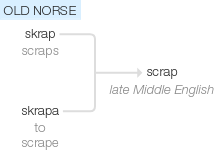Scrap
late Middle English (as a plural noun denoting fragments of uneaten food): from Old Norse skrap ‘scraps’; related to skrapa ‘to scrape’. The verb dates from the late 19th century.
wiktionary
Middle English scrappe, from Old Norse skrap, from skrapa(“to scrape, scratch”), from Proto-Germanic *skrapōną, *skrepaną(“to scrape, scratch”), from Proto-Indo-European *skreb-, *skrep-(“to engrave”)
Unknown
etymonline
scrap (n.1)
"small piece," late 14c., from Old Norse skrap "scraps, trifles," from skrapa "to scrape, scratch, cut" (see scrape (v.)). Meaning "remains of metal produced after rolling or casting" is from 1790. Scrap iron first recorded 1794.
scrap (n.2)
"fight," 1846, possibly a variant of scrape (n.1) on the notion of "an abrasive encounter." Weekley and OED suggest obsolete colloquial scrap "scheme, villainy, vile intention" (1670s).
scrap (v.1)
"to make into scrap," 1883 (of old locomotives), from scrap (n.1). Related: Scrapped; scrapping.
scrap (v.2)
"to fight, brawl, box," 1867, colloquial, from scrap (n.2). Related: Scrapped; scrapping.
